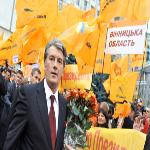13 January 2010

Photo: AP
President Victor Yushchenko in Kiev, Ukraine, 27 Oct 2009
Ukrainians go to the polls Sunday January 17 to elect a new president. In this report from Washington, we look at the legacy of current president, Viktor Yushchenko.
Public-opinion surveys indicate President Yushchenko is trailing several other candidates as the country prepares to vote in presidential elections this Sunday (Jan. 17th). The two front runners are former Yushchenko ally and current Prime Minister Yulia Tymoshenko and Viktor Yanukovich, leader of the "Party of Regions" in the Ukrainian parliament, the Rada.
This is the first presidential election since 2004 when the pro-democracy "Orange Revolution" brought Mr. Yushchenko to power. At that time there was great euphoria and confidence a new era was dawning.
But those hopes were quickly dashed as Mr. Yushchenko and Ms. Tymoshenko engaged in a bitter rivalry. The political infighting, which continues to this day, has brought Ukraine's political process to a standstill.
Robert Legvold from Columbia University says Mr. Yushchenko has no chance of being re-elected.
"Yushchenko has rendered himself a political footnote," said Robert Legvold. "In 2004, coming out of the 'Orange Revolution' it looked as though he, with his partners across the various groovings that made up the 'Orange Revolution' coalition, would be able to exert a strong, new leadership within Ukraine. He did not do that."
Analysts say Ukrainians got weary of the petty political infighting and are essentially blaming Mr. Yushchenko for most of the country's woes.
David Marples, with the University of Alberta (Canada), says the president lacks the common touch.
"If you really put a finger on what went wrong with Yushchenko, it is a lack of communication with the electorate and the public of Ukraine," said David Marples. "He seems to lack that ability to be a kind of populist politician in the same way that Tymoshenko is, or at least she is compared to him - or some of the more notable populist politicians worldwide, people like [Russian Prime Minister and former President Vladimir] Putin, who despite being fairly autocratic, has this ability to communicate with the public and has become quite popular. And he [Yushchenko] simply lacks that."
Many experts, including Marples, also say Mr. Yushchenko was unable to stop corruption, as promised by the leaders of the "Orange Revolution."
"You have in Ukraine something of an almost mafia-like control of key industries by a small number of people who are in close league with each other," he said. "The political process is affected by that because these people are political players as well. I do not think anyone is really talking about the 'Orange Revolution' anymore, or what sort of promises that were cast around five years ago, because I think there is a lot of disillusionment and many people feel that nothing much has happened for the good in the past five years."
Analysts say Mr. Yushchenko's legacy is not stellar. They say his presidency was marked by dire economic times, rampant corruption, poor relations with Russia and an inability to move Ukraine closer to Europe. And with regard to membership in the North Atlantic Treaty Organization, some analysts say Ukraine is no closer now than it was five years ago, at the beginning of the Yushchenko administration.
Once again, David Marples:
"His legacy as president is really not a very happy one," said Marples. "It is the sort of thing that seems to happen to American presidents in the second term - the first term is always fairly rosy, they get re-elected and in the second term, always something comes up. Well it happened to Yushchenko immediately and nothing seemed to work. And I guess he will be remembered, unfortunately, for that - and for a failure to resolve the various problems that seemed to envelop Ukraine at the start of his presidency."
But many analysts, including Robert Legvold, say Mr. Yushchenko will be remembered for the gains achieved by the "Orange Revolution."
"What you say about him is that he presided over Ukraine at a time when for all of this paralysis, had nonetheless maintained a kind of underlying integrity, loyalty to the Constitution and to the legal system, with very considerable freedoms of the media and other things that have been achieved in 2004 - all of that has been preserved," he said.
Experts say the new Ukrainian president must build on the achievements of the "Orange Revolution" while tackling many of the problems Yushchenko faced, but was unable to resolve during his five years in office.